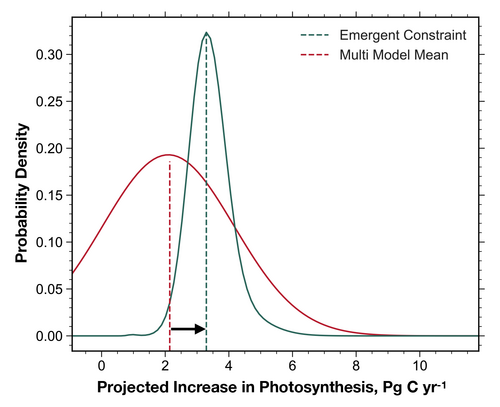Rising CO2 has unforeseen strong impact on Arctic plant productivity
Climate change has a strong footprint on the Earth. The signal is especially visible in high northern latitudes, where amplified warming not only causes permafrost thawing, but also promotes plant growth. Vegetation greening of temperature-limited ecosystems in a warming climate is a well-documented phenomenon. Using the novel approach of Emergent Constraints, the researchers linked changes in high-latitude greening to changes in plant growth as projected in a higher CO2 world. Satellite observations now reveal that the response to CO2 is considerably higher than the average ESM response. This finding indicates that most ESMs likely overestimate future atmospheric CO2 abundance and consequential climatic changes.
Alexander Winkler, PhD student at MPI-M and the lead author of the study, comments on the finding: “Photosynthesis provides the basis for life on Earth. In recent decades, we see that this process is increasingly affected by the consequences of anthropogenic carbon emissions; we detect changes on all continents. In high latitudes, our model-based analysis suggests that plant productivity increases with rising CO2 concentration due to warming and CO2 fertilization, in about equal parts. Long-term satellite and ground observations confirm the tendency of model simulations, but clearly indicate, that the effects of rising CO2 on photosynthesis are more pronounced than what the models tell us.”
“In our study led by Alexander Winkler, we were interested in the response of natural ecosystems to rising temperature and CO2 concentration and neglected human land-use changes. On global scale, however, the greening trend is mainly driven by intensive land-use in the two most populous countries, China and India” says Prof Ranga Myneni, co-author of the study, winner of the prestigious Humboldt Research Award and a long-term guest at the MPI-M. Land surface greening as observed by various satellite missions is a global trend. Over the last two decades, on average 310,000 square kilometers of extra green leaf area, roughly the size of Poland or Germany, appear on Earth’s land every year.
“Arctic ecosystems are changing quickly in response to climate and CO2, affecting carbon fluxes; the land may turn from a small carbon sink to a source” says co-author Prof Victor Brovkin. He adds that although greening is dominant in the region, some areas show browning, likely in response to droughts and disturbances. He adds: “As climate gets warmer and growth period becomes longer, some areas are affected by too little moisture available for plants, especially in the presence of permafrost. A link between hydrology and carbon in the high latitudes is a promising research topic”.
Where is the anthropogenic carbon?, is one of the key question in climate research. In their new study, the scientists shed more light on this important subject and show that the carbon sink through photosynthesis is likely stronger than expected. “Conclusively, predicting future climate change requires an accurate estimation of the strength of this so-called terrestrial carbon sink” adds Alexander Winkler.
Original Publication:
Winkler, A. J., Myneni, R. B., Alexandrov, G. A. & Brovkin, V. Earth System Models Underestimate Carbon Fixation by Plants in the High Latitudes. Nature Communications (2019). doi:10.1038/s41467-019-08633-z
Contact:
Alexander Winkler
Max Planck Institute for Meteorology
Phone: +49 (0) 40 41173 542
Email: alexander.winkler@mpimet.mpg.de
Prof Victor Brovkin
Max Planck Institute for Meteorology
Phone: +49 (0) 40 41173 339
Email: victor.brovkin@mpimet.mpg.de


